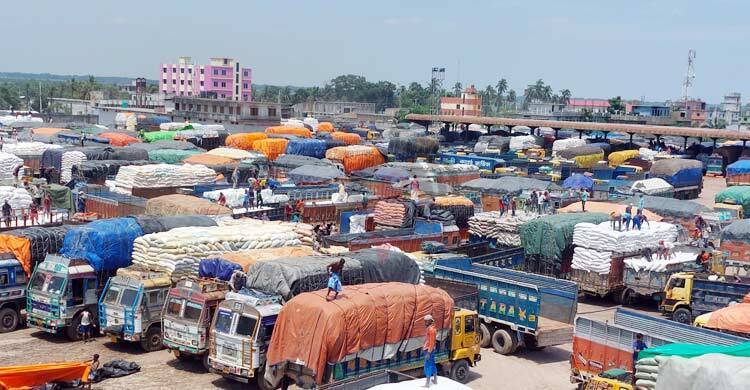Political fallout leaves businesses reeling

Following the fall of Sheikh Hasina's government on August 5, caused by a violent student-led movement, an interim government led by Dr Muhammad Yunus was established on August 8.
The period from mid-July to early August was marked by significant agitation and reorganisation, leaving many major businesses in disarray. As the nation began to recover from political unrest, a devastating flood further compounded the challenges, preventing stability from returning to the country’s business sector.
Even before the unrest, a gas crisis had already affected factory production. Although factories have resumed operations, new problems have arisen, adding to the existing challenges. The procurement of raw materials and the nationwide delivery of products remain disrupted, and sales in wholesale markets have not rebounded.
Traders in various sectors catering to the domestic market report that while factory production has restarted, the supply of imported raw materials is still not back to normal, leading to shortages. Additionally, they are facing significant challenges due to declining sales, a shortage of dollars, ongoing gas and electricity crises, instability in the banking sector, and a lack of available credit.
Several businessmen noted that some industrial groups have shut down their factories due to the changing political landscape, disrupting the market's supply of their products.
Even companies that continue to operate are facing challenges, as many of their distributors, who were politically aligned with the previous government, have not yet resumed business activities. This disruption in supply chains is causing further anxiety among businesses.
Following Sheikh Hasina's departure as prime minister and her flight to India, there were widespread incidents of arson, vandalism, and looting targeting the homes and businesses of government ministers, members of parliament, and Awami League activists.
A distributor of LPG gas for several companies, including Beximco in Dhaka, expressed concern over the current situation, saying, "The uncertainty in the country is making it difficult for some companies to continue operating. I am cautious about engaging in large transactions and am focusing on sustaining my business, but I am worried about the future of the companies I have invested in."
Concerns have also arisen around Beximco Group, owned by Salman F Rahman, the former prime minister's adviser on private industry and investment. Salman F Rahman was recently arrested, adding to the uncertainty surrounding the group’s future.
However, Mehdi Hasan, Chief Marketing Officer of Beximco LPG, reassured that the political situation has not affected their business. "We have maintained our supply levels, just like other companies in the market, despite the overall poor business climate in the country," he said.
The S Alam Group, a major player in the consumer goods market, has been significantly impacted by the political changes, leading to a complete halt in their market operations.
Mohammad Ali Bhutto, Vice President of the Moulvibazar Wholesale Edible Oil Traders Association, commented on the situation, saying, "The absence of S Alam in the market has created a supply chain problem. Their large share in the wholesale market of products like oil and sugar has had a noticeable impact."
Despite the current challenges, other companies are expected to fill the gap left by S Alam, although the transition period may take a month. S Alam's business practices were widely criticized during the previous government, and their current difficulties are seen by some as a positive development.
Khatunganj, the country’s second-largest wholesale market, is also facing severe disruptions. "Business has slowed down significantly in Khatunganj," said Solaiman Badsha, owner of Tayyabia Traders. "Traders from smaller towns are not coming to Khatunganj to buy goods, and only a small amount of daily essentials are being sold." He added that major traders are hesitant to accept checks from banks associated with S Alam, further complicating transactions.
Shahjahan Bahadur, another businessman from Khatunganj, noted that S Alam Group had previously helped keep prices under control in Chattogram, particularly for essential goods like edible oil and sugar. "Now that S Alam is sidelined, other millers are taking advantage of the situation, driving up prices," he said.
Transportation issues have also arisen due to a shortage of trucks and covered vans, resulting in higher rental costs. Additionally, the limited operation of banks is creating problems in financial transactions, with business activity reportedly down to less than 20 per cent of normal levels, according to Bashir Ahmed, President of the Bangladesh Wholesale Traders Association.
Distributors from several companies have echoed these concerns.
Shah Kamal Mostafa, General Manager of Banoful and Company Limited, acknowledged some disruptions at the distributor level, particularly among those involved in politics. However, he emphasised that most distribution activities are continuing, albeit under new management.
One anonymous official from a large company affected by the current situation expressed concern over the reluctance of people to spend money due to the ongoing uncertainty. Despite plans to relaunch the company with new ventures, the business climate remains challenging.
Gazi Group, another large organisation impacted by the political upheaval, has also faced significant setbacks. Most of its establishments were looted and set on fire by miscreants following the departure of former textile and jute minister Golam Dastagir Ghazi. While the company is reportedly preparing to resume business operations, the disruption has been severe.
In light of these challenges, some companies have faced disruptions in their supplier activities.
Maidul Islam, Chief Marketing Officer of Akij Food and Beverage Limited, noted that while some politically involved businessmen have struggled to maintain regular product supply, the overall impact on the market has been limited.
The ongoing turmoil underscores the need for swift and decisive action to restore stability in the business sector as the country grapples with the aftermath of political and natural disasters.

